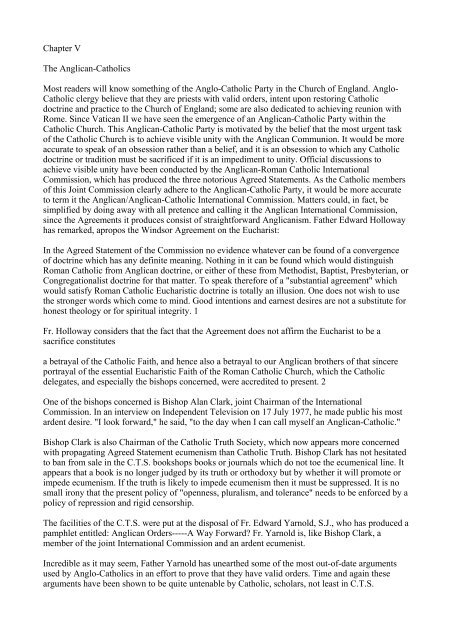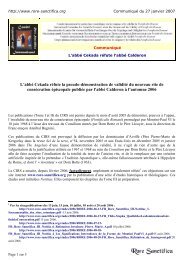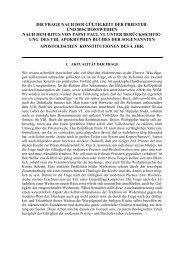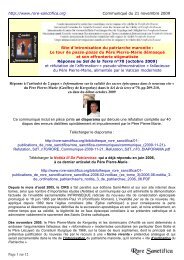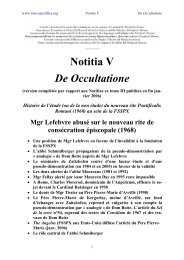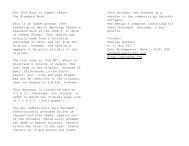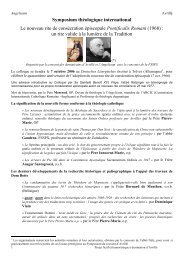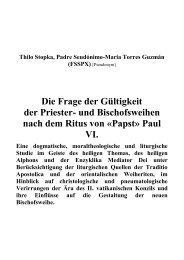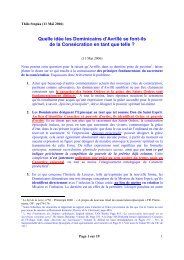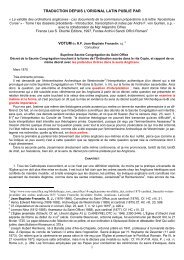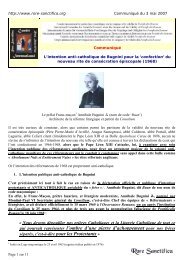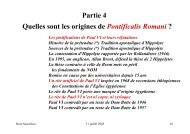THE ORDER OF MELCHISEDECH A Defence of ... - Rore Sanctifica
THE ORDER OF MELCHISEDECH A Defence of ... - Rore Sanctifica
THE ORDER OF MELCHISEDECH A Defence of ... - Rore Sanctifica
Create successful ePaper yourself
Turn your PDF publications into a flip-book with our unique Google optimized e-Paper software.
Chapter V<br />
The Anglican-Catholics<br />
Most readers will know something <strong>of</strong> the Anglo-Catholic Party in the Church <strong>of</strong> England. Anglo-<br />
Catholic clergy believe that they are priests with valid orders, intent upon restoring Catholic<br />
doctrine and practice to the Church <strong>of</strong> England; some are also dedicated to achieving reunion with<br />
Rome. Since Vatican II we have seen the emergence <strong>of</strong> an Anglican-Catholic Party within the<br />
Catholic Church. This Anglican-Catholic Party is motivated by the belief that the most urgent task<br />
<strong>of</strong> the Catholic Church is to achieve visible unity with the Anglican Communion. It would be more<br />
accurate to speak <strong>of</strong> an obsession rather than a belief, and it is an obsession to which any Catholic<br />
doctrine or tradition must be sacrificed if it is an impediment to unity. Official discussions to<br />
achieve visible unity have been conducted by the Anglican-Roman Catholic International<br />
Commission, which has produced the three notorious Agreed Statements. As the Catholic members<br />
<strong>of</strong> this Joint Commission clearly adhere to the Anglican-Catholic Party, it would be more accurate<br />
to term it the Anglican/Anglican-Catholic International Commission. Matters could, in fact, be<br />
simplified by doing away with all pretence and calling it the Anglican International Commission,<br />
since the Agreements it produces consist <strong>of</strong> straightforward Anglicanism. Father Edward Holloway<br />
has remarked, apropos the Windsor Agreement on the Eucharist:<br />
In the Agreed Statement <strong>of</strong> the Commission no evidence whatever can be found <strong>of</strong> a convergence<br />
<strong>of</strong> doctrine which has any definite meaning. Nothing in it can be found which would distinguish<br />
Roman Catholic from Anglican doctrine, or either <strong>of</strong> these from Methodist, Baptist, Presbyterian, or<br />
Congregationalist doctrine for that matter. To speak therefore <strong>of</strong> a "substantial agreement" which<br />
would satisfy Roman Catholic Eucharistic doctrine is totally an illusion. One does not wish to use<br />
the stronger words which come to mind. Good intentions and earnest desires are not a substitute for<br />
honest theology or for spiritual integrity. 1<br />
Fr. Holloway considers that the fact that the Agreement does not affirm the Eucharist to be a<br />
sacrifice constitutes<br />
a betrayal <strong>of</strong> the Catholic Faith, and hence also a betrayal to our Anglican brothers <strong>of</strong> that sincere<br />
portrayal <strong>of</strong> the essential Eucharistic Faith <strong>of</strong> the Roman Catholic Church, which the Catholic<br />
delegates, and especially the bishops concerned, were accredited to present. 2<br />
One <strong>of</strong> the bishops concerned is Bishop Alan Clark, joint Chairman <strong>of</strong> the International<br />
Commission. In an interview on Independent Television on 17 July 1977, he made public his most<br />
ardent desire. "I look forward," he said, "to the day when I can call myself an Anglican-Catholic."<br />
Bishop Clark is also Chairman <strong>of</strong> the Catholic Truth Society, which now appears more concerned<br />
with propagating Agreed Statement ecumenism than Catholic Truth. Bishop Clark has not hesitated<br />
to ban from sale in the C.T.S. bookshops books or journals which do not toe the ecumenical line. It<br />
appears that a book is no longer judged by its truth or orthodoxy but by whether it will promote or<br />
impede ecumenism. If the truth is likely to impede ecumenism then it must be suppressed. It is no<br />
small irony that the present policy <strong>of</strong> "openness, pluralism, and tolerance" needs to be enforced by a<br />
policy <strong>of</strong> repression and rigid censorship.<br />
The facilities <strong>of</strong> the C.T.S. were put at the disposal <strong>of</strong> Fr. Edward Yarnold, S.J., who has produced a<br />
pamphlet entitled: Anglican Orders-----A Way Forward? Fr. Yarnold is, like Bishop Clark, a<br />
member <strong>of</strong> the joint International Commission and an ardent ecumenist.<br />
Incredible as it may seem, Father Yarnold has unearthed some <strong>of</strong> the most out-<strong>of</strong>-date arguments<br />
used by Anglo-Catholics in an effort to prove that they have valid orders. Time and again these<br />
arguments have been shown to be quite untenable by Catholic, scholars, not least in C.T.S.


